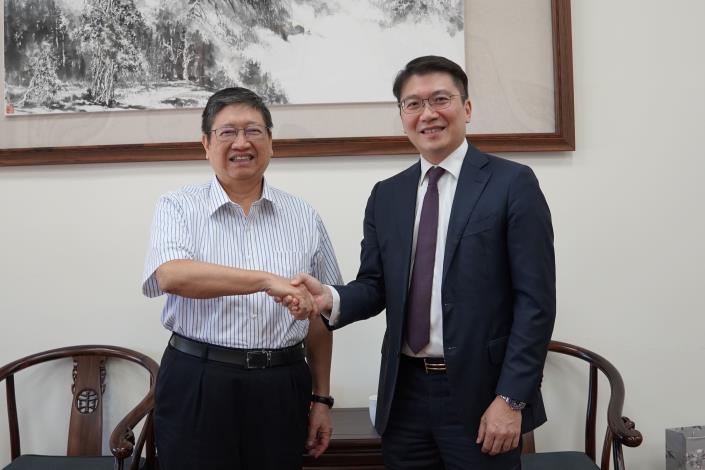
Tony Peng (Peng Shih-hao) grew up in Guanxi Township, but then moved to Malaysia, where he has worked hard for 26 years. Having attained outstanding achievements in agricultural biotechnology, he has returned to his hometown to do his part for local development. Peng was bestowed the honorary title of Dato’ in Malaysia for his achievements, and was appointed as a Malaysian government technological advisor for green industry. He was the only advisor with an ethnically Chinese background. Accompanied by the mayor of Guanxi and representatives of the local Farmers’ Association, Peng visited Hsinchu County Magistrate Yang Wen-ke today (July 4th). Peng likened his return home to a salmon returning to its home waters. He also said he intends to help make Chinese mesona (Platostoma palustre) – a famous product of Guanxi – into a healthier, better-branded crop, elevating farmers’ income and boosting local prosperity.
Hsinchu County Magistrate Yang Wen-ke had praise for how Peng’s work in agriculture and biotechnology has resulted in outstanding achievements in diplomacy. Magistrate Yang noted how Peng’s return home will provide great help to Guanxi in the future, by attracting young farmers and creating employment opportunities, thus helping reduce the population outflow from Guanxi. Magistrate Yang was also optimistic about Peng’s actions in developing agricultural biotech and blue ocean markets, which will drive Hsinchu County’s overall agricultural development.
Tony Peng stated that after finishing his military service in 1997, he went to Malaysia to start a career focusing on agricultural bio-technologization through production of bio-based fertilizers and plant-based vaccines. He collaborated with the Industrial Technology Research Institute and applied technologies to refine and process the enormous amounts of agricultural waste in Malaysia. Peng successfully transformed cellulose into functional sugars (xylitol, L-arabinose, etc.), then provided the products to large health food companies and well-known chocolate producers. Peng noted that large areas of land are planted with palm trees in Malaysia, for which significant funds are invested for fertilizers and other costs. However, a ton of palm oil can only be sold for US$1,000. By contrast, one ton of xylose produced from agricultural waste can be sold for US$40,000.
He pointed out that Guanxi’s mesona is famous for its good flavor, and its growing process puts a lot of emphasis on environmental sustainability. If it is only sold as general food, its price will be beaten by Indonesian mass-produced mesona. In other words, selling Guanxi mesona that way puts it in a disadvantaged, red-ocean-market position, which is really a pity. But if Guanxi mesona can be integrated into health food products, and brand recognition can be built, selling prices could be significantly increased. Guanxi mesona, either as the green plant or used to make dark-brown jellies and juices, could become “green gold” or “black gold”, with its own blue ocean market. Moreover, the residual mesona fibers left after cooking can also be refined and processed, creating an agricultural circular economy.
A person with the Hsinchu County Agriculture Department added that the agricultural products produced in Hsinchu County are clearly distinctive; yet the production area is limited. If advanced agricultural technologies can be integrated into production to develop diverse agricultural spin-off products, this will create a great space for upgrading and transforming local agriculture. The County Government welcomes investment of agricultural technology into Guanxi Town; hopefully its timely application and guided use will create greater added value for agriculture and increase benefits to farmers.